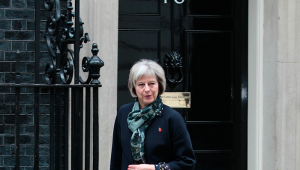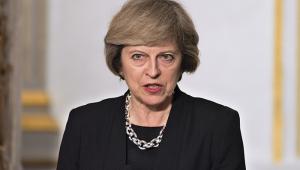If anything captures the remarkable change in the Conservative Party brought about by last year’s EU referendum it is the departure of George Osborne from parliament. A year ago, he was well placed to become prime minister; now he stepping down as an MP to edit a London newspaper while the man he was groomed to succeed is looking for a new role.
In the 12 years since David Cameron snatched the leadership from under the noses of more experienced rivals, this duo had espoused a particular brand of metropolitan Conservatism that the woman who capitalised on their self-destruction is now poised to dismantle.
In calling a snap general election, having denied that she would, Theresa May evinced a ruthless streak that few knew she had.
It is also a gamble, because there are always uncontrollable factors in an election campaign, but this is about as sure fire a winner as it is possible to imagine. With polls giving the Conservatives a 20-point lead or more, she could become the most powerful Conservative premier since Margaret Thatcher.
It is testament to the resilience of the Tory Party that it could withstand the shock of losing its leader yet emerge stronger than before and reinvent itself at the same time as the party of the people.
Announcing the snap general election. Theresa May has been accused of calling the election to manage the Conservative Party. The same cannot be said of Labour, which approaches the election with the trepidation of a condemned man walking to the gallows. A contest that is ostensibly about giving the prime minister a mandate for Brexit could bring about one of the biggest political upheavals for generations by finishing off Labour as a credible national force once and for all.
The party has only one seat in Scotland, hardly any in the south of England outside London and is now faced with losing dozens more in its northern heartlands.
There are caveats, however. The Conservatives need to win a much higher percentage of the vote than Labour to get the same number of seats because people are leaving the urban areas where Labour is strong. So talk of a Thatcher-style landslide is probably wide of the mark. If the Liberal Democrats do well – as they might if they can mobilise the 16 million remain voters and win back some seats – the Conservatives will have to win lots of Labour seats in the Midlands and the North to give May the mandate she seeks. While these look vulnerable, the tribal loyalty of Labour voters remains strong in some areas as was seen at the Stoke-on-Trent by-election.
The chances, then, are that May will have to lower her sights from a three-figure majority to around 80. Party chiefs are briefing that 40 would be good but would look like a failure. She needs to win big to proceed relatively unmolested with her Brexit plan because she knows she will have to compromise in the EU talks.
There will need to be transitional arrangements, delays and all sorts of deals. And her biggest problem will not be the remainers (after all, she was one) but the hardline Brexiteers who will see any concession as a betrayal. If she gets the mandate she is after, those critics will be silenced.
Furthermore, May wants to chart a different economic and social policy course from that in the 2015 election manifesto. The decision to expand grammar schools, for instance, needs to be put to the country for endorsement along with the “one nation” social justice ideas she has sketched out in various speeches.
May is accused of calling this election to manage her own party in the same way that Cameron staged a referendum to placate his eurosceptics and clip the wings of Ukip. There is some truth in that but with one big difference. He came unstuck. She won’t.



















